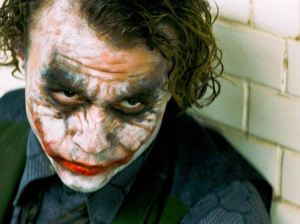“The Dark Knight Trilogy,” co-written and directed by masterful filmmaker Christopher Nolan, is a brilliant achievement in comic book films, but also a large step in the development of Transcendentalism through popular culture.
Who would have thought that the Caped Crusader could have valuable ties to a philosophy involving Thoreau and Emerson?
But it’s true. Not for Batman himself though, but the foes that he butts heads with throughout the trilogy exhibit Transcendental traits that help form the basis for their characters.
In the origin film of the trilogy, Batman Begins, Bruce Wayne/Batman (portrayed by Christian Bale) faces off against a villain named Ra’s al Ghul (Liam Neeson), who intends to terrorize Gotham City using a microwave omitter. Ra’s’ character preaches about restoring balance to the world by ridding of it’s corruption. This ties into Transcendentalism because Ra’s believes that the source of corruption is society, and that to become whole again as a city of justice, the city must be torn down and rebuilt. Ra’s thinks that his instincts and decisions are righteous because in his mind, these actions must be committed. But the fault in Ra’s al Ghul’s master plan is that he believes his actions are right, because others, like Batman, believe that society has corrupted him, and they want to stop him so his corruption does not kill their individuality.
In the thrilling 2008 sequel, The Dark Knight, Batman must face his internal struggles as he battles his deadly and chaotic nemisis known as The Joker (portrayed by Heath Ledger.) The Joker lives in a world built around chaos, and is completely opposed to materialism. This is where Transcendentalism plays it’s part. The Joker makes a deal with the mob in the beginning of the film, agreeing to take half of the pay where the job is concerned. But while he slides down from atop his pile of money, he tells The Chechen that this is his city and burns all of the money, since he strives for chaos, not materialism. The character of The Joker traces back to the philosophy of Transcendentalism because he believes that money causes people to place artificial and false value on certain objects.
Heath Ledger in The Dark Knight
Set eight years after the events of it’s predecessor, The Dark Knight Rises stands as an epic conclusion to the trilogy. After Bruce Wayne/Batman assumes responsibilility for the crimes and death of District Attorney Harvey Dent (portrayed in the previous film by Aaron Eckhart), he lives in hiding as a recluse in the rebuilt Wayne Manor. Now, with Gotham at it’s most peaceful point in years, the city has turned it’s back on Batman. But when terror strikes at the heart of Gotham with a more skilled and powerful mastermind known as Bane (Tom Hardy,) Batman must don his cape and his cowl once again to save his city from this monstrous foe. Bane reveals that his intentions are to fulfill Ra’s al Ghul’s destiny from the first film, and to ultimately destroy Gotham City. Bane’s intentions relate to Transcendentalism in two ways. One way, just like Ra’s al Ghul in the first film, shows that he believes that society has corrupted the citizens of Gotham, and that his decisions are righteous in his mind. The second way, like The Joker in the second film, shows how he despises the materialism in the city of Gotham, and that striving for material gain only corrupts the city and must make the city start over again. Once again, the fault in Bane’s master plan is believing that what he is doing is right, since Batman fights for the individuality and freedom of the city.
Tom Hardy in The Dark Knight Rises





Your post has me thinking about the individual’s in American society. I enjoy stories where there is a fine line between good and evil. Sometimes the heroes and the villains have more in common than they would like to admit. Have you ever watched the FX show “Justified?” Boyd Crowder and Raylan Givens are very similar in many ways–one is a supposed good guy, and the other is a bad guy–but often the line between good and evil blurs. I think the blurring of these lines reflects the reality of our world today.
I agree. And I have not seen “Justified” but I have wanted to see it in the past. But I agree since this line can be blurred many times, especially with Batman in “The Dark Knight Trilogy.” Batman is thought of as a hero in the audience’s eyes, but his dark past blurs the line between good and evil, making it hard for the characters in the story to see what kind of “hero” he truly is.
Pingback: Review: The Dark Knight Rises | The IllusivemanX's Reviews